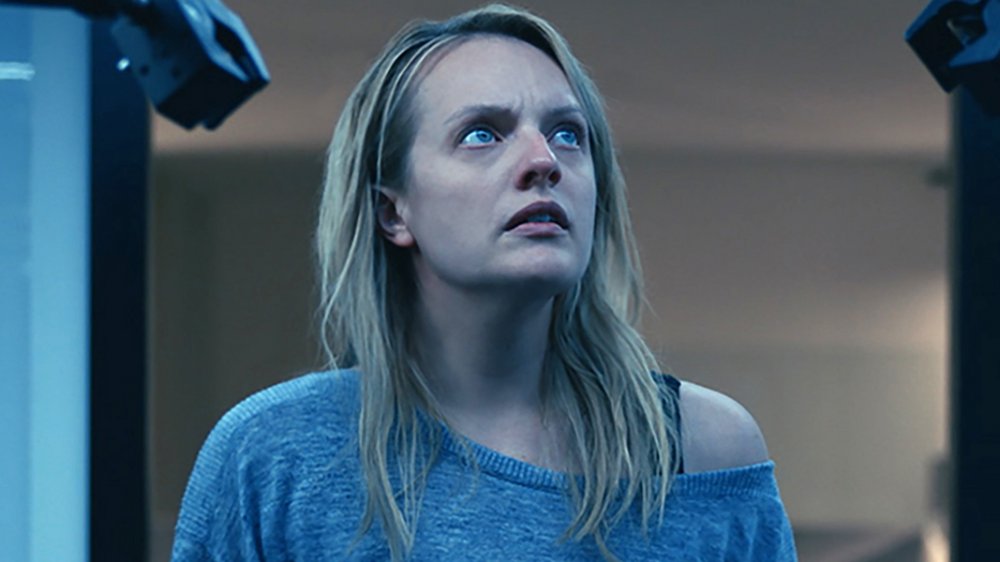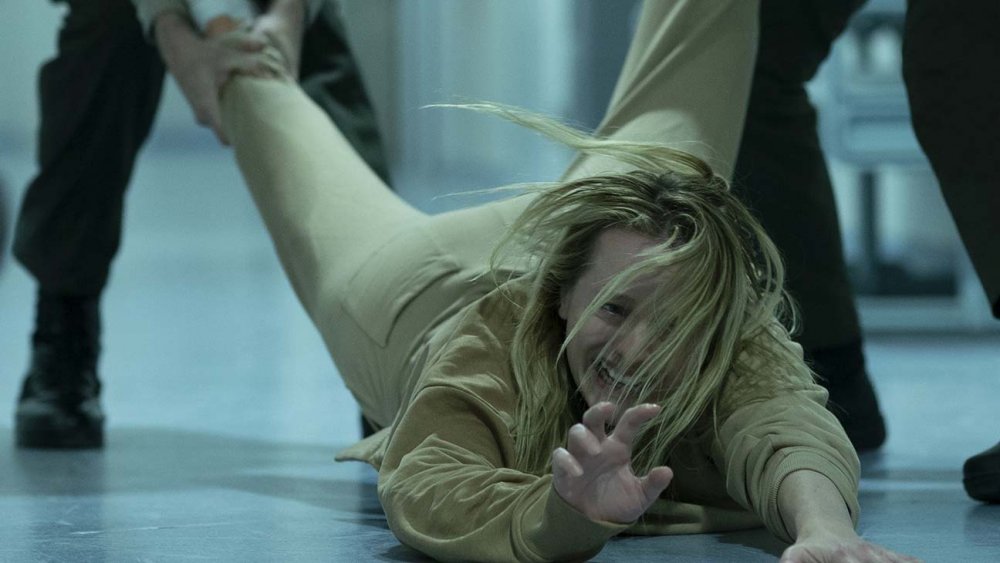Why Now Is The Perfect Time For A New Invisible Man Movie - Exclusive
Universal's interconnected Dark Universe might've fizzled out before it really got started, but the studio's roster of iconic monsters is going to be absolutely fine. Just look at The Invisible Man. Writer and director Leigh Whannell's fresh take on H. G. Wells' original sci-fi novel isn't just one of the best horror films of 2020 – it's also a sharp-witted, modern update of the source material that's perfectly attuned to modern anxieties.
Specifically, The Invisible Man uses its premise to explore abusive relationships, gaslighting, and stalking — topics that feel extremely relevant in the #MeToo era. In the film, Mad Men alum Elisabeth Moss plays Cecilia Kass, an abuse victim who recently escaped her toxic relationship only to learn that her ex, the wealthy genius scientist Adrian Griffin (Oliver Jackson-Cohen), is still tormenting her with some home-brewed invisibility powers. It's not scary because the villain is invisible — it's scary because Cecilia knows exactly what's going on, and no one believes her.
During an exclusive interview with Looper, Whannell opened up about how he approached the source material to make an iteration of The Invisible Man with serious heft.
"Wrapping The Invisible Man around the idea of gaslighting and stalking felt very natural for the movie," Whannell told Looper. "If you try to think about this character in a modern context — like, 'What does it represent? What is this a symbol of?' — it seems very natural to say it's a symbol of the unseen threat, like the woman not being believed and feeling like there's someone watching her."
Besides that, it's well past time that the Invisible Man got his due. Unlike other classic movie monsters, the Invisible Man hasn't made much of an impact at the box office outside of James Whale's 1933 film adaptation. As Whannell explained, "A lot of people have said, 'There have been so many versions of this film before,' and I'm always thinking 'No, there hasn't.'" Whale's film spawned a number of sequels, but they're not particularly well known, and they died out in the mid-1940s. "People's closest reference point today is Hollow Man with Kevin Bacon," noted Whannell.
That movie came out 20 years ago, though, and Whannell appreciated having a more or less blank slate to play with. "If I had been making a Dracula film, there would have been a lot of baggage. Like, I would've felt the weight of all these iterations of Dracula throughout the years," he said. With the Invisible Man, it was different: "I felt safe to bend and stretch the character and kind of take him in the direction I wanted to go."
Modern anxieties, but not a modern trend
Whannell didn't specifically set out to make The Invisible Man address social issues. Ultimately, he just wanted to make a good movie. "I can emphatically tell you with total honesty, hand on my heart, that I was not sitting there going, 'Yeah, these social issues, they're really big right now. I need to do that,'" he said.
Besides, while modern films like Get Out and Hereditary have been praised for fusing horror with social commentary, Whannell doesn't see that trend as anything new: "Horror films have always been Trojan Horses for some larger thing. Horror films are a way to express anxiety. It's the way that we vent."
The writer of both Saw and Insidious, Whannell invokes Invasion of the Body Snatchers, which played on '50s-era Cold War anxiety, and Dawn of the Dead, a thinly-veiled screed against consumerism, to prove his point. Still, there's no denying that the current conversation surrounding gaslighting and abusive relationships played some part in Whannell's creative process on The Invisible Man. As part of his research, Whannell spoke to counselors at a domestic violence shelter in Los Angeles to make sure that The Invisible Man's depictions of abuse rang true. He interviewed some of his female friends, and was struck by how similar their stories were.
"It was interesting to hear them all separately talk about walking to their car at night with their keys in their hand, ready to stab somebody," Whannell admitted. "It's kind of shameful to think that women have to live in this state of self-defense, always assuming the worst if they have to walk from the supermarket to their car."
It's scary but in a real way, and Whannell wanted to capture those fears in The Invisible Man. "I felt there was an interesting opportunity to exploit the evil of the Invisible Man, of what this power is. You know, 'What can you do when you're not seen?'" he said. "Well, that's exactly what women are worrying about is this thing over their shoulder, this feeling they have that someone is there."
It's an ambitious goal, especially for a male director who will only ever experience those anxieties second-hand, but judging by the reactions to The Invisible Man, Whannell succeeded. "I have had a lot of gratifying conversations with someone who has said, 'That really spoke to those fears in a really true way,' or, 'That really reflected something I've felt in my life,'" he said.
The Invisible Man arrives in theaters on February 28.

